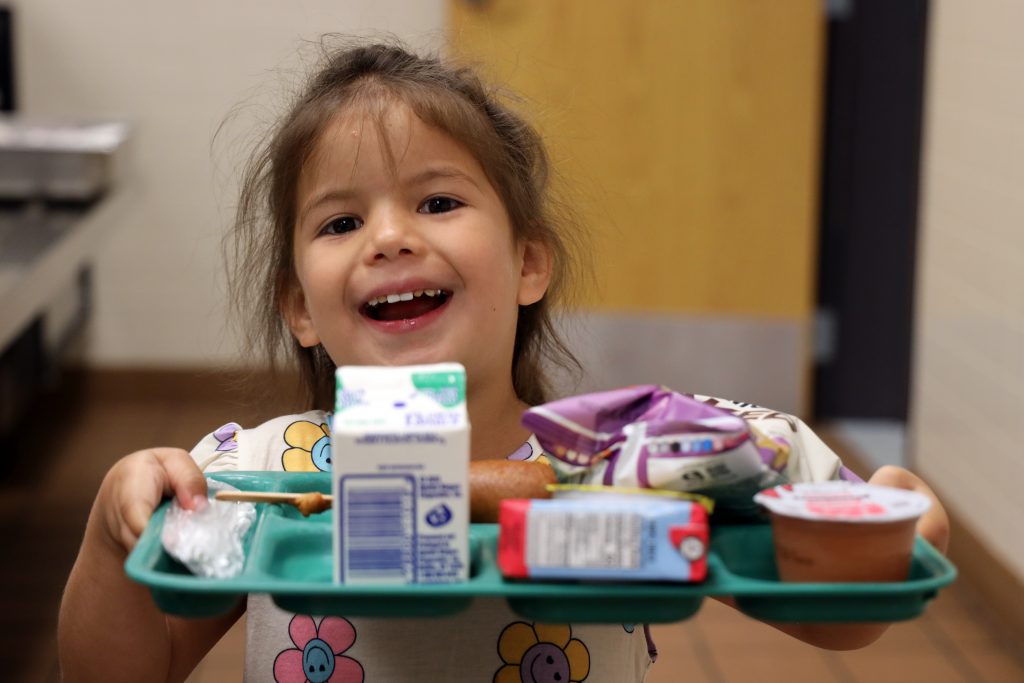
The Salmon River Central School District proudly serves healthy, delicious meals to students every day.
Meal Menus | Meal Prices & Payments | Meal Policies | Benefits of Breakfast | Peanut Butter Protocol | Work in Food Services
Meal Menus
All menus are in PDF format. If you are in need of assistance when accessing the menus, please email communications@srk12.org.
Breakfast & Lunch is Free for All Salmon River CSD Students
All enrolled students at Salmon River Central School District are eligible to receive a healthy breakfast and lunch at school for free during the 2025-26 school year.
This is made possible by the Community Eligibility Provision through the U.S. Department of Agriculture. The provision is a non-pricing meal service option for school districts that are located in low-income areas to help improve food security. The USDA will reimburse Salmon River for the cost of these meals. À la carte items and extra meals are available for students, but they will need to be purchased separately.
To ensure the district’s ability to continue this program in the future, all Salmon River families are asked to complete and submit a Household Income Application (via LINQ Connect or fill out the printed form). That form will also help determine whether your child(ren) may be eligible for other programs. If you have any questions, please contact Food Service Manager Nicole Foster at (518) 358-6682.
Meal Prices & Payments
2025-26 Student Meal Prices
- Breakfast – FREE
- MS & HS Lunch – FREE
- Elementary Lunch – FREE
Payments
The district utilizes LINQ Connect to make easy and secure payments.
Meal Charging and Prohibition Against Meal Shaming
It is the District’s goal to provide students with access to nutritious no- or low-cost meals each school day and to ensure that a student whose parent/guardian has unpaid meal charges is not shamed or treated differently than a student whose parent/guardian does not have unpaid meal charges. Unpaid meal charges place a large financial burden on the District. The purpose of this policy is to ensure compliance with federal requirements for the USDA Child Nutrition Program and to provide oversight and accountability for the collection of outstanding student meal balances to ensure that the student is not stigmatized, distressed, or embarrassed.
View Policy 5660: Meal Charging & Prohibition Against Meal Shaming.
Benefits of Breakfast
Eating breakfast as a child is important for establishing healthy habits for later in life. Schools that provide breakfast in the classroom to all students have shown decreases in tardiness and suspensions as well as improved student behavior and attentiveness. What you eat for breakfast can have an impact on learning. One study showed that eating breakfast food high in fiber and low in sugar for breakfast helped students sustain the cognitive effects of breakfast. School Breakfast provides ¼ the recommended amounts of protein, calcium, iron, vitamin A, and vitamin C for the day.
Eating breakfast can help improve math, reading, and standardized test scores. Children who eat breakfast often behave better in school and get along with their peers more than those who do not. Breakfast helps children pay attention, perform problem-solving tasks, and improves memory. Children who eat school breakfast are likely to have fewer absences and incidents of tardiness than those who do not. By eating breakfast, students get more of important nutrients, vitamins and minerals such as calcium, dietary fiber, folate and protein. Studies have shown that children who eat breakfast on a regular basis are less likely to be overweight.
District Services Links
Food Services
Nicole Foster
School Food Service Manager
Beth Myott
School Lunch Clerk
Phone: (518) 358-6682
Peanut Butter Protocol
Our students’ safety is of the utmost concern to us, and we believe our new protocol strikes a fair balance between protecting our students with allergies, while still allowing parents to choose peanut butter as a cost effective and nutritional option for their child.
Peanuts and peanut products will no longer be served on the menu in any cafeteria in the District. Rather, we carefully selected a nut-free alternative product for the free peanut butter sandwich menu item. We will serve a 51% whole grain oatmeal bar, which comes in two sizes. The smaller size will be offered to UPK through grade 5 students, while the larger size will be offered to students in grades 6 through 12. The bars come pre-wrapped, and are peanut and tree nut-free. There will be various flavor options available, and students will be allowed to save the bars for later, if they wish. The prepackaged protein bars allow for students to do this more easily.
Although we will not serve any peanut products on our menus, we will allow students who bring their lunch to consume peanut products. However, we will ensure that all students with severe allergies are able to eat in a designated nut-free zone in the cafeteria.
This protocol was developed as the result of feedback and collaboration between parents, teachers, and our nurses and food services staff.
work in Food Services
Salmon River Central School District is currently hiring for Food Service Help Substitutes.
If you are interested in applying, you can view the job postings and submit your application online.
Food Services By The Numbers
1,734
Meals Served Daily


329,380
Meals Served Annually
30,139
Summer Meals Served annually


1,361
Students Participating in School Lunch Program